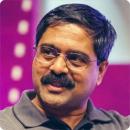Core Software Design Principles
Tuesday, 1:30 PM EST - OPAL SUN
Creating code is easy, creating good code takes a lot of time, effort, discipline, and commitment. The code we create are truly the manifestations of our designs. Creating a lightweight design can help make the code more extensible and reusable.
In this presentation we will take an example oriented approach to look at some core design principles that can help us create better design and more maintainable code.
About Venkat Subramaniam
Dr. Venkat Subramaniam is an award-winning author, founder of Agile Developer, Inc., creator of agilelearner.com, and an instructional professor at the University of Houston.
He has trained and mentored thousands of software developers in the US, Canada, Europe, and Asia, and is a regularly-invited speaker at several international conferences. Venkat helps his clients effectively apply and succeed with sustainable agile practices on their software projects.
Venkat is a (co)author of multiple technical books, including the 2007 Jolt Productivity award winning book Practices of an Agile Developer. You can find a list of his books at agiledeveloper.com. You can reach him by email at venkats@agiledeveloper.com or on twitter at @venkat_s.
More About Venkat »